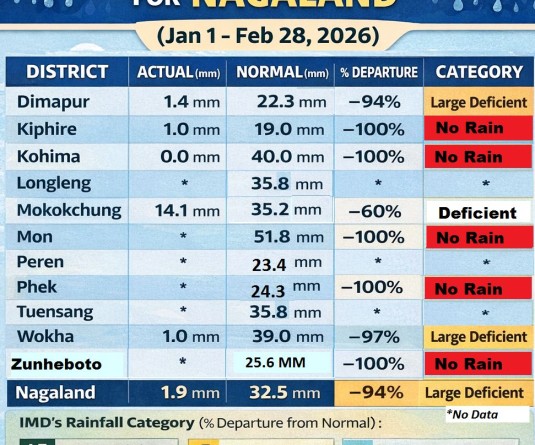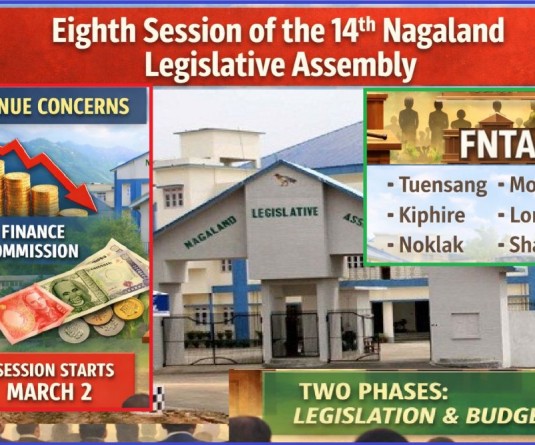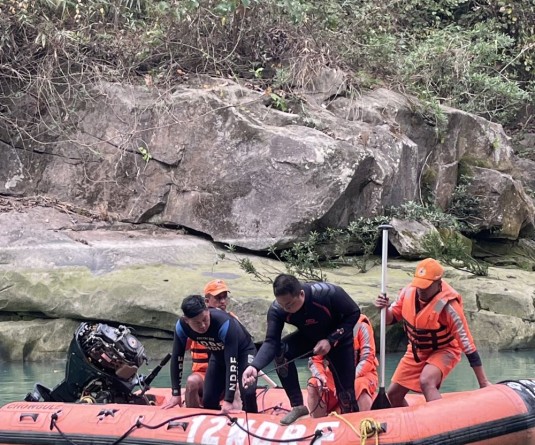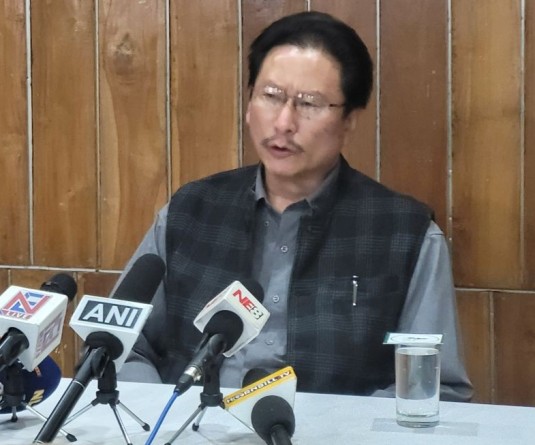
International conference focuses on stronger relationship between India & Myanmar
Chizokho Vero
Kohima | December 2
The need to strengthen relationship between India and Myanmar “politically, economically and socially” has been strongly felt at the International Conference on “India’s Northeast: The Bridgehead between Myanmar and India” held here today in the presence of delegates from Myanmar, France and Canada and the Indian delegation.
Speaking on the occasion, Nagaland’s Chief Minister Neiphiu Rio invited Myanmar business houses to invest in Nagaland and use the State as a natural springboard for trade and commerce with the rest of India while assuring them that the best of terms would be provided for their investment in Nagaland. He also urged Myanmar to take the bold step of opening up their Naga inhabited areas as it is still quite difficult and cumbersome to visit, “let alone do business.”
Also stating that the Myanmarese cultural troupes have also participated in the Hornbill Festival, Rio said that these cultural exchanges need to be strengthened and institutionalized. He also proposed to the Myanmar government to consider setting up of a permanent cultural office in Nagaland.
Rio remarked that the Northeast region was considered as security burden and more of a liability for India for so many decades. He however, said that in the context of the emerging global opportunities and dynamics, the region can easily emerge as the convergence of the dynamic economics of the 21st century of South East Asia including China, once the region gets proper infrastructure of transport and communication and other business linkages.
He said that the Government of India will have to focus development efforts to sustain stronger ties with its neighboring countries, especially Myanmar, as key to breaking the Northeast’s geo-political isolation. “Northeast India would greatly benefit from expanding opportunities in Myanmar where gradual political reforms after decades of military rule have paved the way for foreign investment,” he said.
Asserting that the historic Battle of Kohima which changed the tide of the Second World War was not a chance occurrence but a crucial battle to control the Moreh-Imphal-Kohima-Dimapur road that opens up South East Asia to the plains of India, Rio reiterated that it is not about wars with guns and bombs today.
However, he said the geographic importance of the region remain unchanged especially in the context of the emerging global market economy.
Further, terming Prime Minister, Dr. Manmohan Singh’s recent visit to Myanmar as part of the initiatives under India’s “Look East Policy”, Rio also expressed pleasure that India has agreed to upgrade an extensive network of roads and bridges in Myanmar that would effectively connect the northeast and the rest of India upto Thailand as early as 2016. Apart from the issues of connectivity and economic linkages, Rio also felt the urgent need to improve people-to-people contacts and stated that the Government of India and Myanmar should continue to maintain the policy of open border in this sector.
With regard to border trade, Rio said that India and Myanmar signed a border trade agreement in 1994 and has now only two operational border trade points, Moreh-Tamu and Zowkhatar-Rhi. Recently, he said, an agreement was reached on setting up a third trade point at Avakhung-Pansat/Somra, which falls in Nagaland sector and further urged the Ministry of External Affairs, the Ministry of Commerce and Industry at both sides to work on operationalizing this third border trade point.
Rio said that the northeastern states could also be a convenient destination for health care and education. Today there are a number of multi-specialty healthcare centres in the north east, both in the private and public sectors offering state-of-the art –facilities.
Another strong point of the north east, he said, is its high literacy rate, in which, Rio said that the region have a vast reservoir of educated and dynamic workforce, fluent in English, progressive ion outlook and IT savvy. “The Government of Myanmar could look at our educated youth in terms of potential teachers and instructors,” he said adding that students from Myanmar could look at the education institutions, in the northeastern states for their educational requirements.
“We can offer opportunities to study in our institutions starting from primarily levels, to higher education, to university levels including professional courses in engineering, medicine, management, nursing, information technology etc,” Rio said.
Stating that the state government has been very vocal on the need to recognize and support the rights of Nagas in Myanmar, Rio said the government had submitted a memorandum to the Government of India to extend financial assistance to develop Naga inhabited areas in Myanmar, with a comprehensive list of Naga villages, population, and townships, along with the maps.
The state government met the Ambassador of Myanmar, who had pledged speedy development of Naga inhabited areas in Myanmar.
“I am happy to note that recently, Naga Self-Administered Zone was created at Lahe as Headquarter under Sagain Division in Myanmar. Nagas in Myanmar are now participating actively in the mainstream politics of Myanmar, and there are several Naga parliamentarians and legislators in Myanmar, elected during the last election,” Rio told the Conference.
Pinak Ranjan Chakravarty, Special Secretary’s (PD), Ministry of External Affairs, Government of India, Sai Boe Aung, member of Union Parliament, Myanmar, Dr. Khin Zaw Win, Director Tampadipa Institute, Yangon, Prof. Veena Sikri, Professor, Ford Foundation Chair, Bangladesh Studies Programme, Academy of International Studies, Jamia Millia Islamia and Dr. Sreeradha Dutt, Director, Maulana Abdul Kalam Azad Institute for Asian Studies, Kolkatta also spoke on the occasion.
The conference was jointly organized by Maulana Abdul Kalam Azad Institute for Asian Studies (MAKAIAS) Kolkata, School of Social Sciences, Nagaland and Tampadipa Institute, Yangon, Myanmar with the support of the Government of Nagaland and Public Diplomacy Division, Ministry of External Affairs, Government of India.






